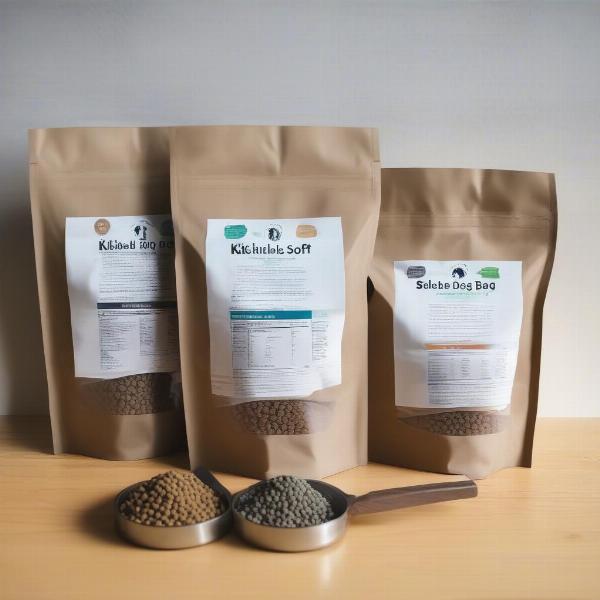Soft kibble is an increasingly popular choice for senior dogs, offering a gentler option for aging jaws and teeth while still providing complete and balanced nutrition. As our canine companions enter their golden years, their dietary needs change, and finding the right food can significantly impact their overall health and well-being. This guide will explore the benefits of soft kibble for senior dogs, discuss key factors to consider when choosing a brand, and provide practical tips for transitioning your senior dog to a softer diet.
Why Choose Soft Kibble for Senior Dogs?
As dogs age, they may experience dental issues like tooth loss or gum disease, making it difficult to chew traditional dry kibble. Soft kibble offers a more palatable and easier-to-chew alternative, ensuring your senior dog can comfortably consume their meals and receive adequate nutrition. Senior dogs also often experience a decrease in appetite, and the enticing texture and aroma of soft kibble can help stimulate their interest in food. Moreover, many senior dogs develop digestive sensitivities, and soft kibble is often formulated with highly digestible ingredients to minimize digestive upset.
Key Considerations When Choosing Soft Kibble
Selecting the right soft kibble for your senior dog involves considering several factors. Look for formulas specifically designed for senior dogs, as these typically contain lower calorie counts to accommodate decreased activity levels and adjusted protein levels to support maintaining muscle mass. Ingredients are crucial; opt for high-quality protein sources, wholesome grains, and a balance of essential vitamins and minerals. Avoid artificial colors, flavors, and preservatives.
 Comparing various brands of soft kibble for senior dogs
Comparing various brands of soft kibble for senior dogs
What Should I Look for on the Ingredient List?
The ingredient list is your window into the nutritional value of the soft kibble. Look for whole meat sources like chicken, beef, or fish listed as the first few ingredients. Wholesome grains like brown rice, oats, or barley can provide fiber for healthy digestion. Added glucosamine and chondroitin can support joint health, a common concern for senior dogs. Always consult your veterinarian before making any significant dietary changes, especially if your senior dog has pre-existing health conditions.
Transitioning Your Senior Dog to Soft Kibble
Introducing a new food should be done gradually to avoid digestive upset. Start by mixing a small amount of soft kibble with your dog’s current food. Gradually increase the proportion of soft kibble over several days or weeks until the transition is complete. Monitor your dog for any changes in stool consistency or digestive issues during the transition period.
Conclusion
Choosing the right soft kibble can significantly improve your senior dog’s quality of life by making mealtimes more enjoyable and ensuring they receive the necessary nutrients for healthy aging. By considering factors like ingredients, nutritional profile, and your dog’s individual needs, you can help your beloved companion thrive in their golden years. Soft kibble is a supportive option that can make a real difference in the health and happiness of your senior dog.
FAQ
- Is soft kibble better than dry kibble for senior dogs? Soft kibble can be a better option for senior dogs experiencing dental problems or decreased appetite. However, the best choice depends on your individual dog’s needs.
- How do I transition my senior dog from dry to soft kibble? Gradually mix increasing amounts of soft kibble with their current food over several days or weeks.
- Can soft kibble help with my senior dog’s digestive issues? Many soft kibbles are formulated with highly digestible ingredients to support senior dog digestion.
- Are all soft kibbles for senior dogs the same? No, different brands offer varying formulas and ingredient profiles. Choose one that meets your dog’s specific needs.
- Should I consult my vet before switching my senior dog to soft kibble? Yes, it’s always a good idea to consult your vet before making any major dietary changes, especially for senior dogs with pre-existing health conditions.
- What are some signs my senior dog might need soft kibble? Difficulty chewing, decreased appetite, weight loss, and digestive issues can indicate a need for softer food.
- Is soft kibble more expensive than dry kibble? Soft kibble can sometimes be slightly more expensive than dry kibble due to the manufacturing process and specialized ingredients.
ILM Dog is your go-to resource for expert advice on all aspects of dog care and nutrition. We offer valuable information on dog breeds, health, training, nutrition, grooming, and much more. Whether you’re a seasoned dog owner or just starting out, ILM Dog has the resources to help you provide the best possible care for your furry friend. For any inquiries, feel free to reach out to our team via email at [email protected] or by phone at +44 20-3965-8624. Learn more at ILM Dog.